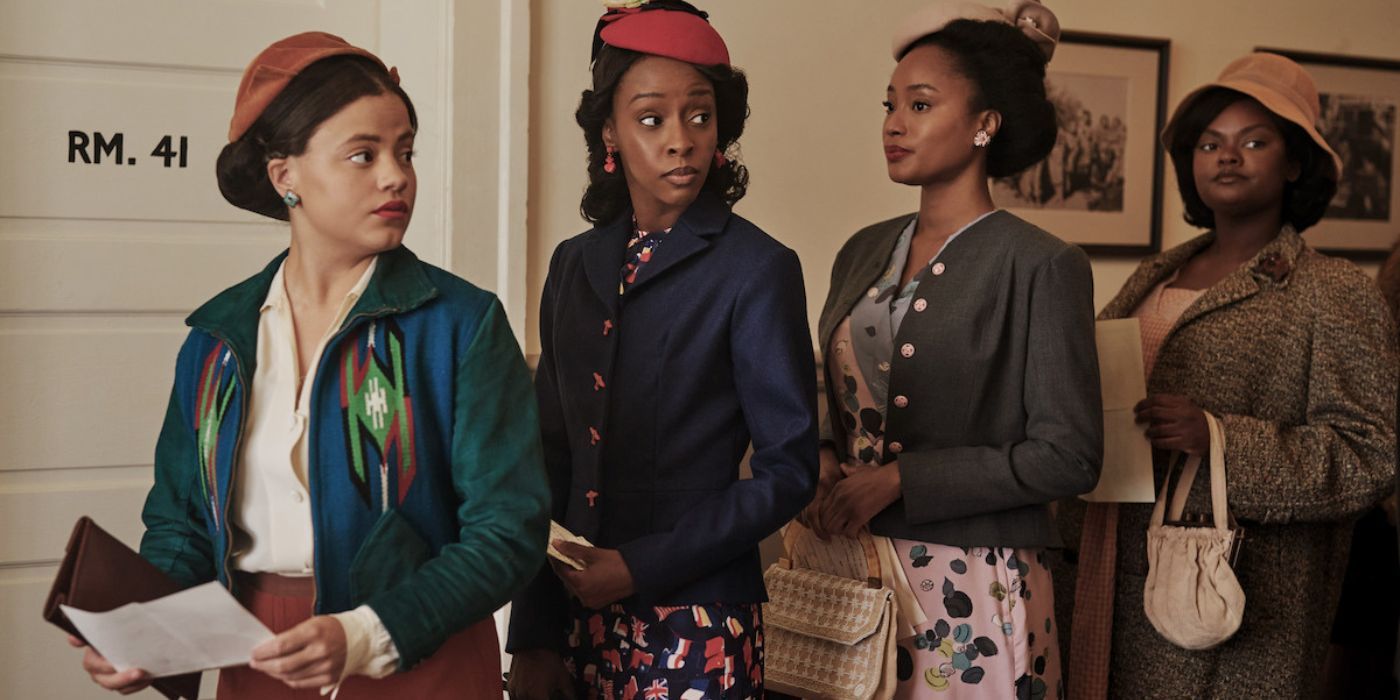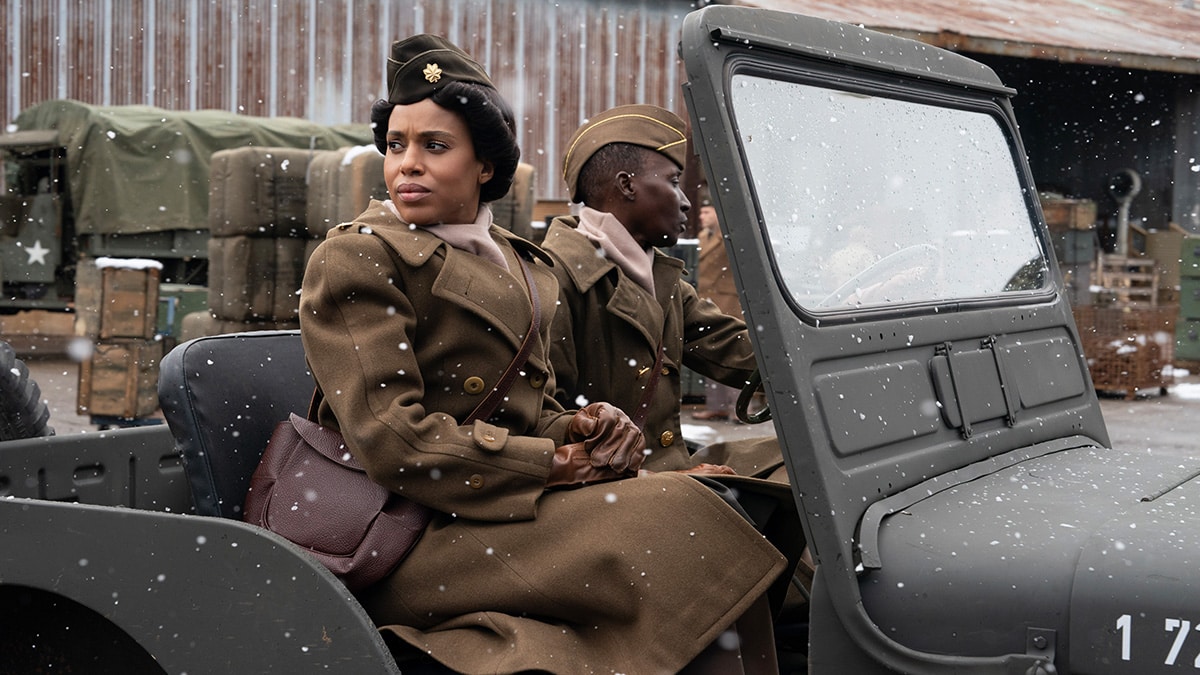Director: Armani Ortiz, Tyler Perry
Writer: Kevin Hymel, Tyler Perry
Stars: Kerry Washington, Ebony Obsidian, Milauna Jackson
Synopsis: 855 women joined the war to fix the three-year backlog of undelivered mail. Faced with discrimination and a country devastated by war, they managed to sort more than 17 million pieces of mail ahead of time.
There are many examples of directors who primarily work in one field or genre moving successfully into another. Usually, these creatives have understood the nuances of what makes their chosen genre great and applying those to the next. Tyler Perry is not one of those directors. The Six Triple Eight, his attempt at a prestige historical drama bringing to light the efforts of the first and only battalion of Black Women soldiers deployed in Europe during WWII is ham-fisted, exasperating, filled with lines no one could imagine any human being delivering, and entirely surface level.

The film opens in 1943 on the Italian front line. Young American soldiers attack and are beaten back. An infantry man encounters a pilot who has been shot from the sky. He’s dead. He pulls a blood-stained letter from his pocket and places it in a sack. Letters from families and soldiers echo. No one has heard from the front lines. Without word from home or afar, the stasis of anxiety is causing morale issues. This much is told clearly and concisely in two scenes. However, Perry will continue to reiterate how important the mail is because it was what the WAC group was begrudgingly sent to Scotland to oversee. Perry will also reiterate every basic theme in the film to the point where one wonders if he’s so used to telling a gag six times in his comedy work hoping repetition hits the mark, that he has no idea that audiences might not know about the work of Charity Adams (Kerry Washington) and her troops, but they have heard of racism and misogyny before.
Flashback to Bloomfield, Pennsylvania and we meet our focus heroine, soon to graduate schoolgirl Lena Derriecott (Ebony Obsidian). Her childhood friend Abram David (Gregg Sulkin) arrives at her high school to drive her home. A White teen stands between them telling him he shouldn’t be seen spending time with a Black woman – it’s improper. But, of course, the friends are inseparable and in love. “She’s so horrible for treating you that way for the color of your skin,” says Abram at his going away party. The bright-eyed Jewish boy is off to fight Hitler. He declares his love for Miss Lena that very night: Her: “You know this is not right in the eyes of many people.” Him: “The only eyes that matter are ours.” He declares his intention to court and marry her on his return. He will write to her.
Lena is an intelligent and sensitive young woman. Her aunt Susie (Baadja-Lyne Odums) wants her to go to college. Her mother, Emma (Donna Biscoe) doesn’t want Lena to have any pie-in-the-sky ideas. Struggling as essentially a single mother, as her husband has vanished, there is no money and experience has shown her that being a woman and Black is about keeping your head down to survive. Nevertheless, she wishes her daughter the best. Susie and Emma are ridiculously thinly drawn characters. Often, they exist simply to deliver exposition in a scene where none is needed. Lena is getting letters from Abram which is shown by Lena going to the door and not getting letters from Abram and placing the other mail on a tray with disappointment. “I guess she don’t get no letters,” says one. Yes – that was the scene we just watched. When the news comes that Abram has died and Lena takes to her bed in grief (again, shown) the voice over from the women below is, “She’s not getting out of bed.”

Lena makes the decision to enlist. There is no money for college. “There ain’t no way they’re going to let you fight Hitler,” says one of them. “You will just be cooking and cleaning for White folks and you can do that here.” Lena is firm. She needs to find a trace of the life she might have lived with Abram, and she must find a way to fight.
Once on the train to basic training, segregation happens almost immediately. The White women are sent to a different compartment. The audience meets the women who will be the core characters they follow through their journey from training camp in Georgia through to deployment in Europe. A Black-Latina, Delores Washington and history buff (Sarah Jeffrey), her cousin and math genius Elaine White (Pepi Sonuga), a Harlem woman looking for an education, Bernice Baker (Kylie Jefferson), and a rural woman who worked in the cotton fields escaping her violent husband, Johnnie Mae (Shanice Shantay). Elaine tells them that she and Delores were told they failed the entry exam, but they wrote to esteemed African American Women’s leader Mary McLeod Bethune (played in a cameo by Oprah Winfrey) and she ensured they were admitted. Mary McLeod Bethune is a close friend of Eleanor Roosevelt (who turns up played by Susan Sarandon and a set of false teeth). Johnnie Mae’s response boils down, “Ooh ain’t you all fancy pants,” as she’s there for men, adventure, and her own version of liberation.
At training camp in Georgia, the women encounter the reality of military life as delivered by Captain Charity Adams, the exacting head of training and the highest-ranking Black woman in the WAC. “We have the burden to be better,” she says again and again. The military is still segregated, no one wants women fighting to begin with, and the last thing anyone wants is Black women fighting and succeeding. It is the war on two fronts. Every small personal failure from one of her soldiers is an indelible failure for Black women.

While Lena, who is not physically strong, struggles through boot camp supported by Delores, Bernice, and Elaine but often antagonized by the buxom wildcard Johnnie Mae, Captain Adams along with her 2IC Noël Campbell (Milauna Jackson) struggle with a racist command system that refuses to deploy any of the soldiers she has trained. Adams’ Captain’s rank means nothing to White men from Private through to Major. It seems they will be going nowhere until Eleanor Roosevelt is made aware of the issue of the lack of post getting through to families and soldiers. Alerting her husband FDR (Sam Waterson), he sets up a meeting with one dimensional racist General Halt (Dean Norris, sweating, growling, and Southern drawling through the role) who insists that no one has been able to deal with the problem because all transports have been diverted to the fighting. “We even put the women on it,” he says. Not the Negro women, Mary McLeod Bethune points out. Charity Adams and her division, the 855 women strong WAC 688th have their mission regardless of if Major Halt likes it or not – and he most certainly does not.
The ludicrous cliched dialogue and set-ups break apart almost every point Perry and co-director Armani Ortiz try to make. The second half of the film in which the women come up with ingenious systems to identify the mail and sort what ended up being over seventeen million pieces is overshadowed by clunky character work, cheap visuals, melodrama, and stagey acting. Asking the question is Kerry Washington, good in her role. who becomes excruciating because the script rarely lets her act. All that can be said is she does her best with sub-par material. Ebony Obsidian delivers lines like she’s in a first stage rehearsal community theatre play. We are supposed to believe in character development for Johnnie Mae but as she is the rough-hewn foil to the accomplished, serious, and polite characters in the group she’s ironically tokenized.
The 688th did something incredible for the war effort in connecting families and soldiers during the later parts of the war in Europe. They were asked to achieve the near impossible with no support and active interference from a command that would prefer their men go without mail and morale than to allow Black women to succeed. Yet, apart from a handful of scenes, Tyler Perry reduces the enterprise to badly written, visually cheap, amateurly acted schmaltz. Even a postscript with the real Lena falls flat because the audience has long since stopped being invested in her if they ever really were. “You put a human face on to what we are doing,” Major Adams tells Lena after it is revealed what motivated Lena to keep going in the army. As if it is some kind of revelation that caring about the dog tags of deceased soldiers being mailed home is something a woman with an MA in psychology couldn’t work out for herself without a visual representation from a distressed Private under her command.
Audiences are well enough acquainted with narratives about World War II, sexism, and racism that they don’t need the issues spelled out as if they are children encountering these ideas for the first time. For many people it will be the first time they’ve heard of the WAC 688th – women who deserve to be celebrated. Tyler Perry’s film is an object lesson in how not to tell a story of adversity, dignity, service, and fortitude. The Six Triple Eight is cheap when it should be rich, hollow when it should be deep, and fundamentally bad narrative storytelling.





